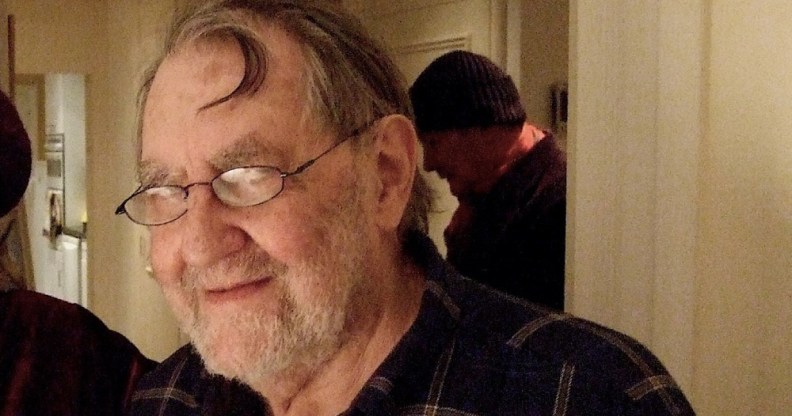Pioneering AIDS researcher Dr Joseph Sonnabend, ‘one of the most important figures in the history of AIDS’, dies aged 88

Joseph Sonnabend has passed away. (Facebook)
Pioneering AIDS researcher Dr Joseph Sonnabend has died at the age of 88, after suffering from a heart attack earlier this month.
Dr Sonnabend was one of the first physicians to notice among his gay male patients the immune deficiency that would later be named AIDs. He has been praised for his empathetic loyalty to his clients and his fierce criticism of medical institutions failing to respond to the AIDS epidemic.
AIDS activist and close friend David Kirschenbaum said: “When thinking of all his accomplishments and contributions to saving lives during the AIDS crisis, one cannot separate Joe the scientist/physician from Joe the man.”
“His compassion for humanity was the driving force behind all that he was able to achieve in medical research. This is why he eschewed the spotlight which he so rightly deserves.”
In a post on Twitter, journalist Patrick Strudwick remembered Sonnabend in 2018, which was one of the last interviews he ever gave. He described Sonnabend as “very no-nonsense”, “uncompromising” person with a “love for his patients”, even keeping tapes of their messages on his answer machine from the ’80s.
He wrote: “It was as if the whole pandemic was buried in him, weighing him down, often bubbling up. But he knew — because it was true — that he did everything he could. In this, he was the best of us. Rest now, Joe. You’ve earned it.”
I’m deeply saddened to learn that Dr Joseph Sonnabend, one of the most important figures in the history of AIDS, died yesterday. I spent time with him in 2018 for one of the last interviews he ever gave. Let me tell you about this man and what he did: 1/https://t.co/XSPEfZKzBr
— Patrick Strudwick (@PatrickStrud) January 25, 2021
Dr Sonnabend was born in Johannesburg, South Africa. He later trained in infectious diseases at the University of the Witwatersrand in Johannesburg and the Royal College of Physicians in Edinburgh,
In the 1960s, he worked under Alick Isaacs, the co-discoverer of interferon and one of Britain’s leading virologists, at the National Institute of Medical Research in London. Interferons are any of several related proteins that are produced by the body’s cells as a defensive response to viruses, and it was one of the first drugs tested for the treatment of AIDS-related conditions.
Dr Sonnabend moved to New York City in the early ‘70s to continue interferon research.
In 1978, he volunteered at the Gay Men’s Health Project in Sheridan Square, Greenwich Village, and started a private clinic for treated sexually transmitted infections. He was among the first clinicians to recognise the emerging AIDS epidemic when gay men in his practice were becoming sick with rare immune-suppressed illnesses.
Dr Sonnabend hypothesised that AIDS was caused by multiple exposures of the immune system to an attacking agent. These multiple exposures included sharing infected needles and unprotected sex.
Dr Joseph Sonnabend wrote the first book on safer sex in the AIDS epidemic.
In May 1983, Dr Joseph Sonnabend, along with two gay men he knew, helped write the first booklet on safer sex in the AIDS era How to Have Sex in an Epidemic. It was the original public health advice to recommend using condoms to help protect against the virus.
Also in 1983, he helped establish the AIDS Medical Foundation to help further his research and that of other scientists into virus plaguing the gay community. This organisation would later become amfAR (The Foundation for AIDS Research) one of the world’s leading supporters of HIV/AIDS research, prevention and advocacy.
Dr Sonnabend was also a pioneer of community-based research in the absence of effective government efforts to control the AIDS epidemic. He helped establish the non-profit Community Research Initiative in New York in 1987, and he served as medical director of the organisation until 1996.
In 1987, he co-founded the PWA Health Group (now called People With AIDS Working for Health Inc), which was the first organisation to bring new – but not yet approved drugs – to those with HIV/AIDS.
In 2000, he was recognised as an inaugural Award of Courage Honouree by amfAR.
He retired from his medical practice in New York in 2005 and moved to London. On World AIDS Day 2005, he was awarded a Red Ribbon Leadership Award from the National HIV/AIDS Partnership.
In 2018, at the age of 85, he made his public debut as a composer of classical music. He participated in a concert at London’s Fitzrovia Chapel as part of the AIDS Histories and Cultural Festival.
Dr Sonnabend died on Sunday (24 January 2021) at the Wellington Hospital in London, after suffering a heart attack on 3 January. He is survived by close friends, former colleagues, a number of his patients and two sons.

